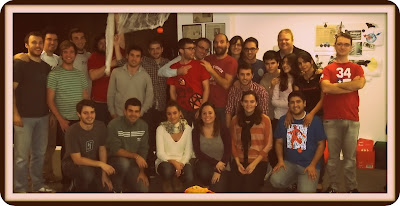... it is by standing on the shoulders of giants. (Issac Newton)
I'm almost one year in peerTransfer, being the QA Engineer, and I like this company.
I was the first and only tester the dev team ever had, so we have spent many hours talking about what my role should be and what the team and the company is expecting from me.
This has been evolving as we found new needs. I been testing new features we have been rolling out, and also reviewing the requirements of new stories, taking care of the automated test suite, estimating when needed, testing production setups... and having fun!
Last week the dev team faced a change in the code. Operations team needed to refactor their process and we needed to make changes in the code to follow along.
But once we saw the requirements, we still had a feeling about... something was still missing. The requirements we're okay, but because the change was big, three devs and I went to a meeting room to try to find out how to roll out the change without impacting the operations flow.
After some debate, we started to suspect that the model we where following was not exactly the right one, we had some discrepancies about what we where asked for and what we allready knew about operations crew was doing.
... so we asked two of the operations guys to join us on the meeting. After a few questions to pinpoint our doubts, I made a simple question:
"Please, can you explain again what is the problem you have."
And there it was, the problem the ops team was clear, and now we understood better the mission of this change.
One of the devs came out with a fast workaround that helped mitigate the impact of the time we would need to perform the change, and by doing so we where buying some time to develop the full feature.
After this meeting, we talked to the product team, to help getting the new requirements and putting the needed story on the kanban board, and start working on the solution.
This meeting was not scheduled. The time we spent on it was not measured in order to keep track about how much time each of us spend at the end of the month in meetings, we did not have a previous plan for the discovery, there were no managers managing the meeting.
We where just a bunch of professionals trying our best to get a solution...
and we did it, or at least, we came out with a plan, and the willingness to try our best.
you see, working with these people make me proud. It feels nice when you are standing on the shoulder of giants and you can see further.










